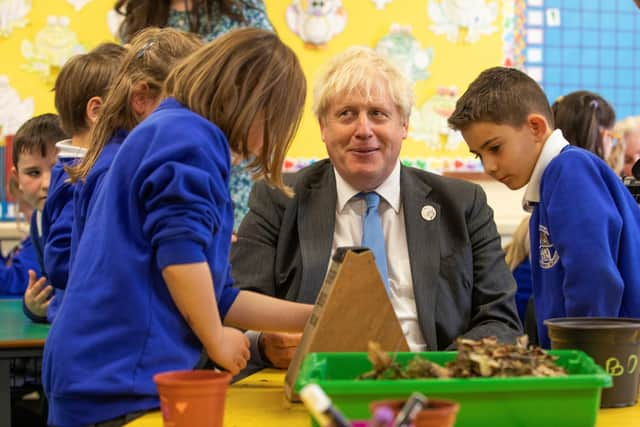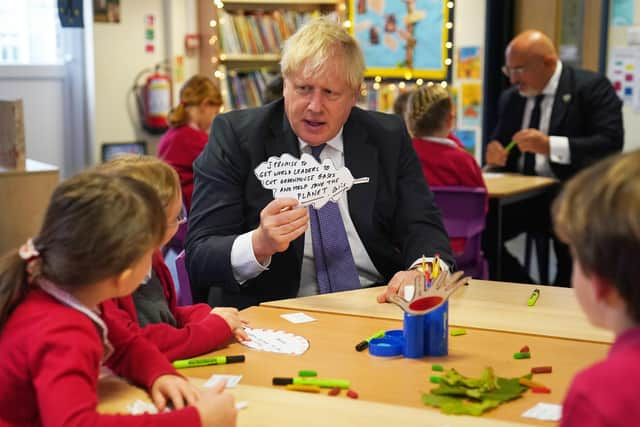Levelling up in action or policy gimmick? Boris Johnson makes new 'parent pledge' for every pupil
The Government set a target in last month’s Levelling Up White Paper of 90 per cent of pupils leaving primary school at the expected standard of literacy and numeracy by 2030 - far above the current rate of 65 per cent. Yorkshire faces the biggest national challenge in hitting the target, with just 63 per cent at the expected standard - the joint lowest percentage alongside the East Midlands.
Education Secretary Nadhim Zahawi will today set out the pledge in the Schools White Paper. It promises schools will identify pupils at risk of falling behind and offer them a range of support including tutoring sessions in small groups, with parents kept informed of their child’s progress.
Advertisement
Hide AdAdvertisement
Hide AdThe White Paper will also aim for the national average GCSE grade achieved in English and maths to rise from 4.5 in 2019 to five by 2030.


Mr Johnson said: “Literacy and numeracy are the building blocks of a world-class education. They unlock the learning, knowledge and skills that every child needs to succeed in later life.
“So today, we are making a pledge to every parent, if your child falls behind at school in either of these key subjects, their school will help them get back on track.
“By making sure every child receives excellent teaching which helps them reach their full potential, we will spread opportunity and futureproof our mission to level up the country.”
Advertisement
Hide AdAdvertisement
Hide AdBut the pledge was described as a “policy gimmick” by Geoff Barton, general secretary of the Association of School and College Leaders. He said schools already have their own robust systems for tracking pupils’ progress while he warned it could create tension with parents by creating an unrealistic expectation of various forms of additional support “on demand”.


He said: “Improving English and maths outcomes is a laudable ambition, but there is little recognition of the wider societal factors which affect those outcomes, such as the fact that nearly a third of children in the UK live in poverty. It is hard to learn when you are hungry, cold, poorly clothed and live in inadequate housing. Focusing so intensely on English and maths, important as those subjects are, is also a very narrow view of education.”
Bradford, Doncaster and the North Yorkshire Coast are among the 24 highest-priority areas that will receive intensive support and extra funding to “rapidly raise standards”.
Mr Zahawi said: “This is levelling up in action. The Opportunity for All White Paper will deliver for every child, parent and family, living anywhere from rural villages, to coastal towns through to the largest cities, by making sure all children have access to a school that meets our current best standards, harnessing the incredible energy and expertise of the one million people that work in schools.
Advertisement
Hide AdAdvertisement
Hide Ad“Any child in Yorkshire and the Humber who falls behind in maths or English will get the support they need to get back on track, and schools will also be asked to offer at least a 32.5 hour school week by September 2023.
“We know what works in schools and we are scaling up to ensure that every child can expect interesting, enriching lessons. Parents rightly expect a world class education for their children and that is what we will deliver.”
Charity boss backs parent pledge
A charity boss has hailed the inclusion of the “parent pledge” in the Schools White Paper.
John Jolly, chief executive of Parentkind, said: “I am delighted that the Education Secretary has taken notice of the research on parent voice, recognised the vital contribution of parents and sought to place parents at the front and centre of the schools paper.
Advertisement
Hide AdAdvertisement
Hide Ad“Children’s literacy and numeracy have been shown to improve with parental support, and making dedicated efforts to enable greater parental participation in children’s learning can only have hugely beneficial consequences for families and society.”
Robert Halfon MP, chairman of the Commons’ Education Select Committee, said: “Increasing parental engagement through the “parent pledge” will help break down long-standing and often complicated barriers that exist to help increase attendance, especially in relation to the 124,000 “ghost children” who have dropped out of the school system following the outbreak of the pandemic.”
Paul Whiteman, general secretary of the NAHT school leaders’ union, said that “no one would disagree with the ambition that every child should be supported to achieve their full potential”.
But he added: “There has been a support deficit for far too long. Schools cannot do it alone.”
Advertisement
Hide AdAdvertisement
Hide Ad“It also requires a focus on the policies that are likely to make the biggest difference to pupil outcomes. This is where the Government’s White Paper falls short.
“Commitment to adequate funding, access to support services or detail on how these bold ambitions will be achieved is sadly missing.”
Other key elements of the Schools White Paper
Today’s Schools White Paper says all schools should have joined, or be in the process of joining, a “strong” multi-academy trust by 2030.
Under the plans, councils will be able to set up and run their own academy trusts, which it is hoped will encourage more primary schools to become academies.
Advertisement
Hide AdAdvertisement
Hide AdCouncils will also legally be able to request for their non-academy schools to join a trust.
A minimum standard length for the school week will be set, with all schools required to have a week of at least 32.5 hours’ length by September 2023.
The paper says that by 2025, Ofsted will inspect every school, including a backlog of schools previously rated “outstanding”, some of which have not been inspected for years.
The Government said that the Education Endowment Foundation charity will receive at least £100 million in funding, so that it can continue to evaluate the best teaching practice over the long term, and spread this across the country.
Advertisement
Hide AdAdvertisement
Hide AdThe paper also announces that 500,000 teacher training and development opportunities would be introduced, and affirmed a commitment to raise starting salaries to £30,000.
It pledges to introduce a register for pupils not in school to ensure “no child is lost” from the system.
And it sets out plans for every school to have access to funded training for a senior mental health lead to establish whole school approaches to wellbeing.
The paper pledges for up to six million tutoring courses to be delivered by 2024 and promised action to cement tuition as a permanent part of the education system.
Advertisement
Hide AdAdvertisement
Hide AdSupport The Yorkshire Post and become a subscriber today. Your subscription will help us to continue to bring quality news to the people of Yorkshire. In return, you'll see fewer ads on site, get free access to our app and receive exclusive members-only offers. Click here to subscribe.